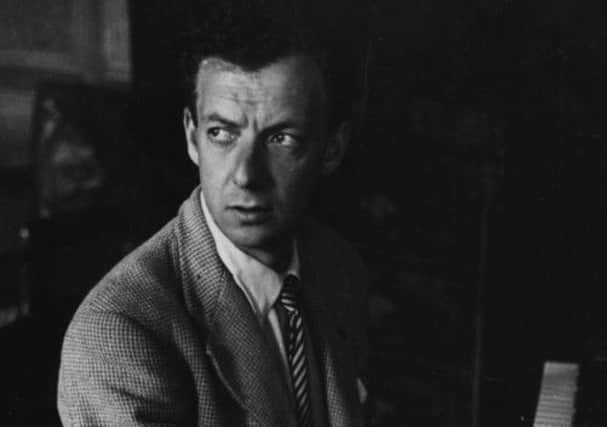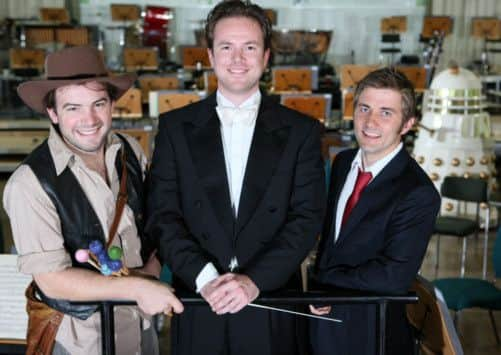Scotland celebrates Benjamin Britten


IT’S true to say that all of Britain is celebrating Britten this year. An extensive document – Britten 100 – appeared late last year alerting us to the fact that, 100 years after the composer’s birth in Lowestoft, the music of Benjamin Britten would be celebrated throughout 2013, that barely a part of the British Isles would not resound to his music at some point in the centenary year, and that by the end of it all, Britten’s place as the most successful and influential British composer of the 20th century would be permanently cast in stone.
Over the next week, the spotlight turns on Scotland, where a rare collaboration between the Scottish Chamber Orchestra, the Royal Scottish National Orchestra, the BBC Scottish Symphony Orchestra and the Scottish Ensemble has resulted in a series of concerts highlighting different aspects of Britten’s music.
Advertisement
Hide AdThere’s even one specifically for children – a performance at Glasgow Royal Concert Hall on Saturday, as part of the Children’s Classics Concerts series, featuring Britten’s brilliantly descriptive musical manual to the wonders of the symphony orchestra, A Young Person’s Guide to the Orchestra.


What makes this YPG different from any previous performance of the work is that regular Children’s Classics presenters – those lively young percussionists Owen Gunnell and Oliver Cox – have come up with a modernised narration to accompany the performance by the RSNO, under its own youthful associate conductor Christian Kluxen.
Gunnell and Cox have been a revitalising force in the financially troubled children’s series, so it’s reasonable to predict that their new-look version of YPG will be worlds removed from the original narration for the 1948 documentary film that was written by Montagu Slater – Britten’s collaborator on his opera Peter Grimes – although Paul Kidea’s excellent new biography on the composer suggests that, actually, it may ultimately have been penned by Britten himself.
“Yes, we’ve brought it up to date,” says Cox. “We’ve changed the wording from that rather deadpan classroom style of the 1940s and 50s, to something that is deformalized, punchier, and more personalised. And we’ve thrown in namechecks for the various soloists. But the music is just so fantastic, we just want people to come and see for themselves.”
Gunnell and Cox are, themselves, worth seeing in action. They met as percussion students on their very first day at the Royal College of Music.
“I was busy unpacking my belongings on day one at the student residence, when Owen knocked on my door and said, ‘Fancy a pint?’” Cox, who first picked up the drumsticks at school in Haddington, recalls. “We’ve worked together ever since.” That was just over a decade ago.
Advertisement
Hide AdAfter college, they shot to fame on the Edinburgh Fringe with their highly entertaining double act, O Duo – a virtuoso floorshow that is as physical as it is musical. And more recently, as regular presenters of Children’s Classics, they have rebuilt a profile for the series that took a temporary tumble a couple of years ago when a major sponsor ended its support.
By applying their creative energy to this particular Britten work, Gunnell and Cox are refreshing our minds to the superlative magical tricks the composer played in piecing the music together. YPG is, in effect, a virtuoso set of variations on a rondeau theme by Purcell, culminating in a complex whirlwind fugue, the climax of which witnesses the Purcell theme entering to spectacular effect.
Advertisement
Hide AdThe actor David Hemmings – whose boyhood live-in association with the gay Britten, albeit deemed innocent by Hemmings himself, was once as speculative an issue as Michael Jackson’s ambiguous associations with young boys – once referred to those final bars as “the champagne moment – f***ing great!” For once, the expletive is well justified.
So what other magical Britten moments can we look forward to in the coming week? The Purcell connection is more closely investigated tonight at the Queen’s Hall in Edinburgh (and tomorrow in Glasgow) when Richard Egarr conducts the SCO and SCO Chorus in works by both composers, including his own arrangement of four of Purcell’s Catches – bawdy little vocal rounds the composer wrote for performance in taverns, or anywhere else well out of earshot of the church.
But this programme has a serious point to make, homing in on vocal works by both Britten (A Hymn to the Virgin) and Purcell (My heart is inditing), and the fact that Britten so admired and emulated the earlier composer’s ingenuity in setting texts. More of the same in next week’s second commemorative concert by the SCO, when composer George Benjamin conducts a performance of the Serenade for Tenor, Horn and Strings, featuring the tenor John Mark Ainsley and SCO principal horn Alec Frank-Gemmill.
As for the BBC SSO, its Britten tribute consists of two contrasting programmes: tonight’s performance, under Donald Runnicles, of the wartime Sinfonia da Requiem – a gripping anti-war statement by the pacifist composer that must have baffled its Japanese commissioners, who had asked for something to celebrate the 2600th anniversary of the Japanese Empire – and next week’s afternoon performance (25 April) of the Simple Symphony, the work that Britten famously moulded out of musical doodles he made as a boy.
Also in that second concert is the Scottish premiere of Colin Matthews’ Movements for a Clarinet Concerto, an arrangement and orchestration created from sketches Britten made for a projected clarinet concerto.
The Purcell connection rears its head again on 24 April at Glasgow’s City Halls, in a mixed programme by the Scottish Ensemble, fresh from its current tour of the United States. It culminates in a performance of Britten’s late dramatic cantata Phaedra, with the superlative Jane Irwin as soloist.
Advertisement
Hide AdThis isn’t all the Britten we’ll hear in Scotland during this centenary year, but this week-long celebration is certainly the most concentrated slice of the cake. And it shows Scotland’s orchestras in an uncommonly collaborative light, where the sum of the parts is very likely to add up to something far greater than the whole. That, in itself, is something to savour, and to celebrate.
• For full details of the Scottish Orchestras’ week-long tribute to Benjamin Britten, see: www.sco.org.uk; www.rsno.org.uk; bbc.co.uk/orchestras/bbcsso; and www.scottishensemble.co.uk